Tourist privilege couldn’t be clearer, yet it’s something we travelers often overlook. Let’s not.
“The child is very malnourished,” the old doctor said matter-of-factly, examining a limp boy with a stethoscope for an apathetic half second. He surveyed him through dim light from a single bulb, flickering in his office inside a crumbling rural hospital in Bangladesh.
The patient’s mother, swathed in a black abaya and yellow floral hijab, clutched the boy to her. A square of black cloth hid her face. Only her eyes were visible, glinting attentively as she watched the doctor scratch names on a prescription pad. After a short exchange in their local dialect, she stood and carried the boy out of the office, prescription in hand.
“What did you prescribe him, then?” I asked the doctor once she left. Conversation covered my awkward discomfort. Brought there by my local host to meet the English-speaking doctor—conversational English is rare in rural Bangladesh—I’d watched the scene play out from across his desk.
“A few things.” His eyes, shielded by glasses, pointed ever so slightly in two different directions. “I say the boy needs to eat more nutritious foods. He only eats biscuits and sweets. But she just wants medicine, so I prescribe medicine to make her happy.”
“Nutritious foods? Like what… fish or vegetables? There are many on this isla-”
“No, like more oily foods,” he cuts me off impatiently, as if it’s the most obvious thing in the world.
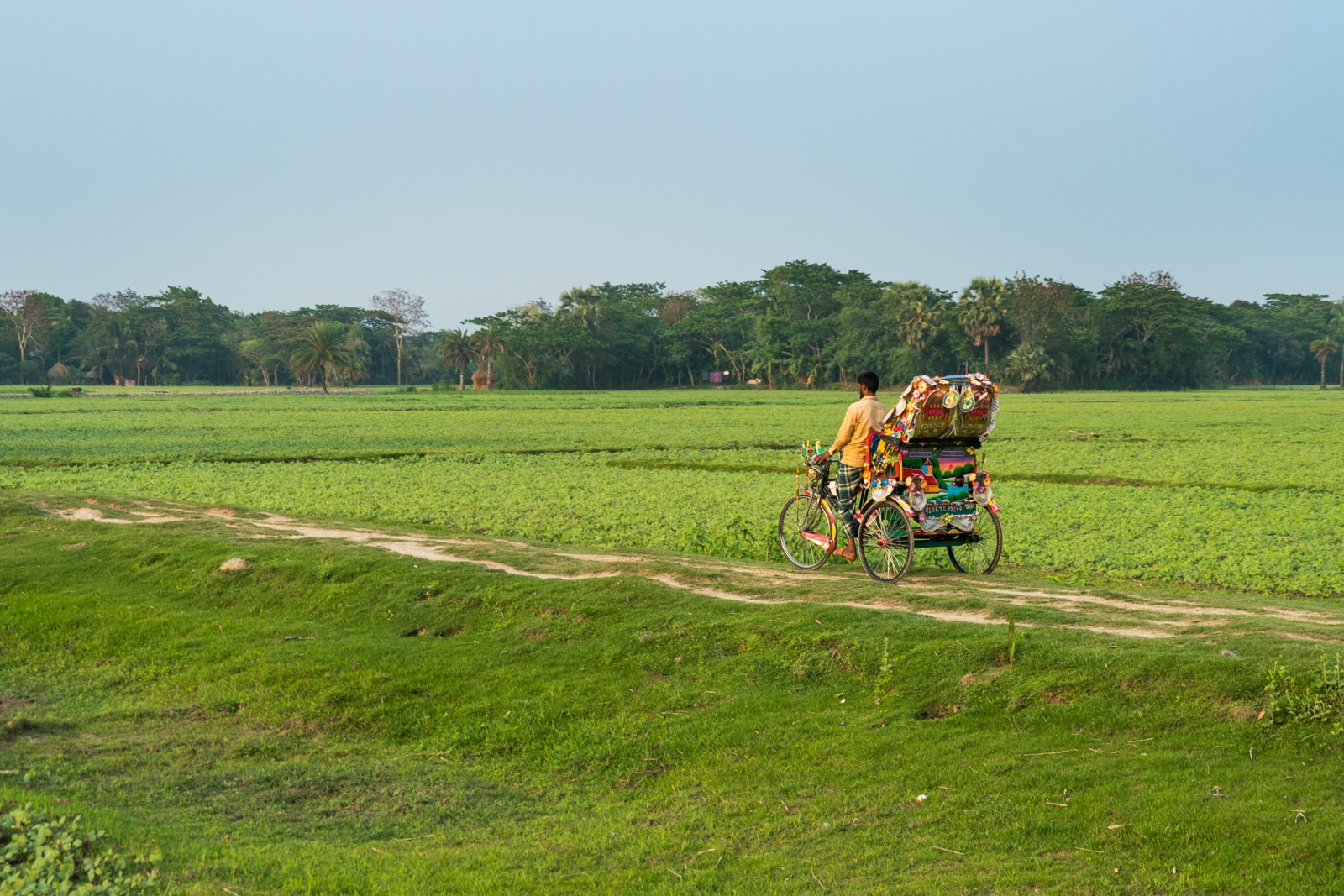
Welcome to Monpura, Bangladesh
Why are you here?
Our exchange took place on Monpura, one of many islands at the intersection of the Meghna River and the Bay of Bengal in Bangladesh.
One week before, I had no inkling of the island’s existence. An article offhandedly mentioning Monpura’s lush natural beauty and lack of tourists was enough to draw me to its shores. As a lover of “off the beaten track” destinations, visiting Monpura was an obvious choice… but the locals I met once there were dubious about my decision.
“Why have you come to Monpura?” the doctor asked me from behind his desk. As I gave a pageant-worthy spiel about natural beauty and kind people, he nodded slowly, leaning back.
“Yes. I suppose for you, a tourist, it is a very beautiful place. But for the people of Monpura, life is very hard. There are no facilities.
I want to leave, but I cannot find anyone to replace me. No one wants to live here.”
Understandable. A devastating cyclone killed tens of thousands of people and destroyed most of Monpura in 1970; the island is still recovering. Overwhelmingly poor and farmers and fishermen make up most of the island’s population. The literacy rate is around 35%. Many live in corrugated tin houses; even middle class concrete houses I visited had dirt floor kitchens with holes in the ground for stoves.
Yet there I was, an ignorant foreign girl chirping happily about the richness of pretty roads lined with banana trees and friendly locals.
Late that night, after visiting the hospital, I lied wide awake in bed, staring up at mosquitoes whining and circling the netting over my bed.
What was I doing there?
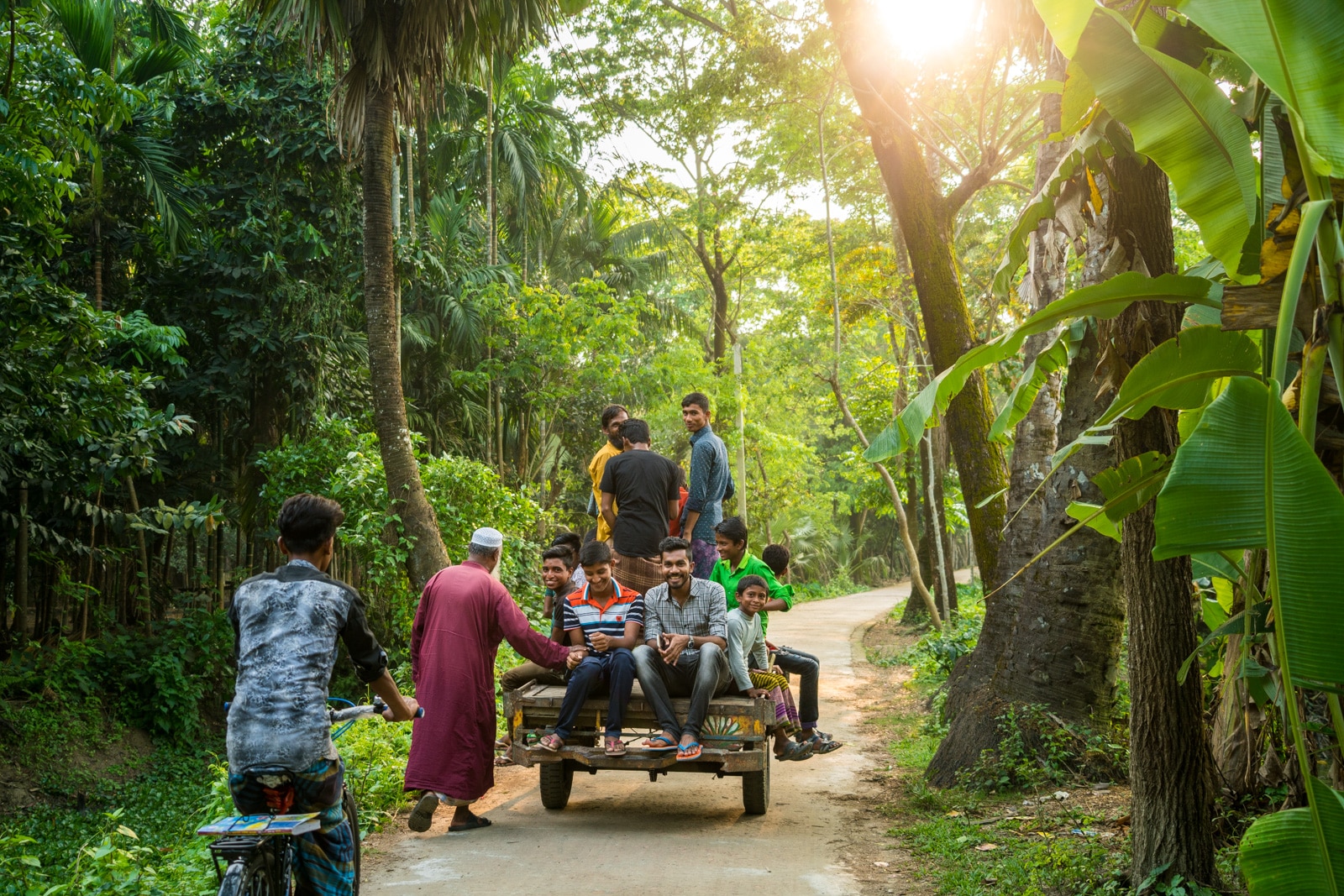
For the record, Monpura is damn beautiful.
Voyeur voyage
The interaction haunted my thoughts for weeks. Years later, I can still hear the doctor asking his simple question.
Was I really an innocent tourist? Or was I some kind of freakish voyeur, subconsciously feeding on the suffering of others? A dark tourist using those less fortunate to stroke my adventure ego and satisfy morbid curiosities?
I began to doubt my travels. My interests. My intentions. The life I’ve created for myself.
I began scrutinizing everything I did, from the way I spoke to chai vendors to how I chose my next destinations. Critical ears dissected traveler conversations about countries visited, paradises found, journeys undertaken. Wondering why was a part of every process, whether I was opting for convenience store ice cream or diving through seas of taxi hawkers.
Why am I driven to travel as far from home as possible?
What draws us privileged travelers to developing countries?
Is it wrong for me to want to be here?
I found no concrete answers, only more questions.
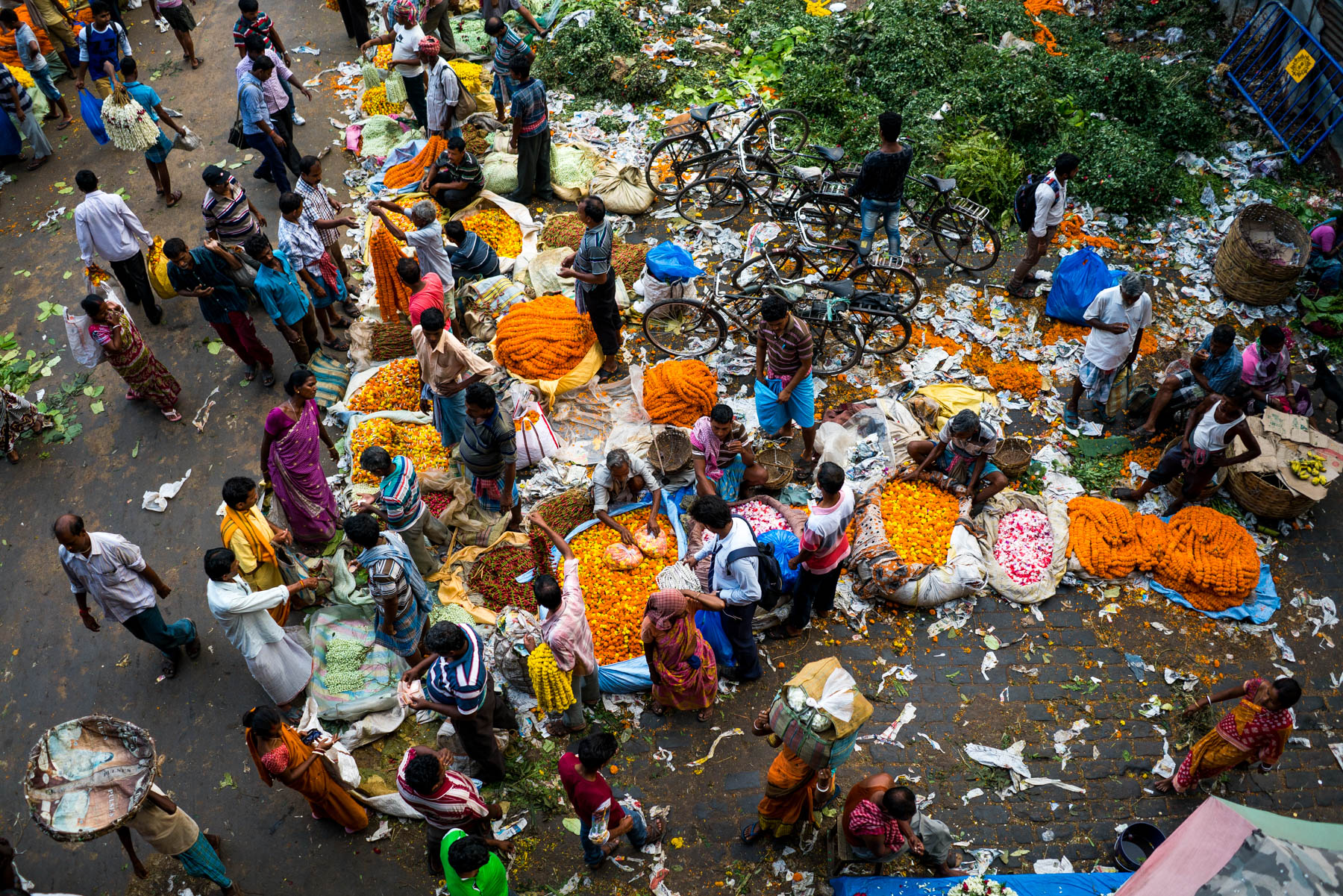
What is it that draws travelers from developed countries to always seek out scenes like this flower market in Kolkata, India?
Dual perspectives
A year and a half later, I came full-circle with a woman on the side of a dusty road in Khorog, capital of Tajikistan’s Pamir region.
“Now you know what it’s like to live in Tajikistan,” the young woman said. Long auburn hair pulled into a bun accentuated the strain in her face as she surveyed the main road, quiet on a Sunday morning. She needed to go west, I needed to go east, but we both stood waiting for cars that might never come.
“I want to spend time with my mother in Bartang before I must go back to my study in Germany,” she said, her voice trembling anxiously, “but I do not have much time. Only a few days. I need to go today.” She glanced up hopefully at a white van slowing to stop near us. False alarm—just a passing local minibus.
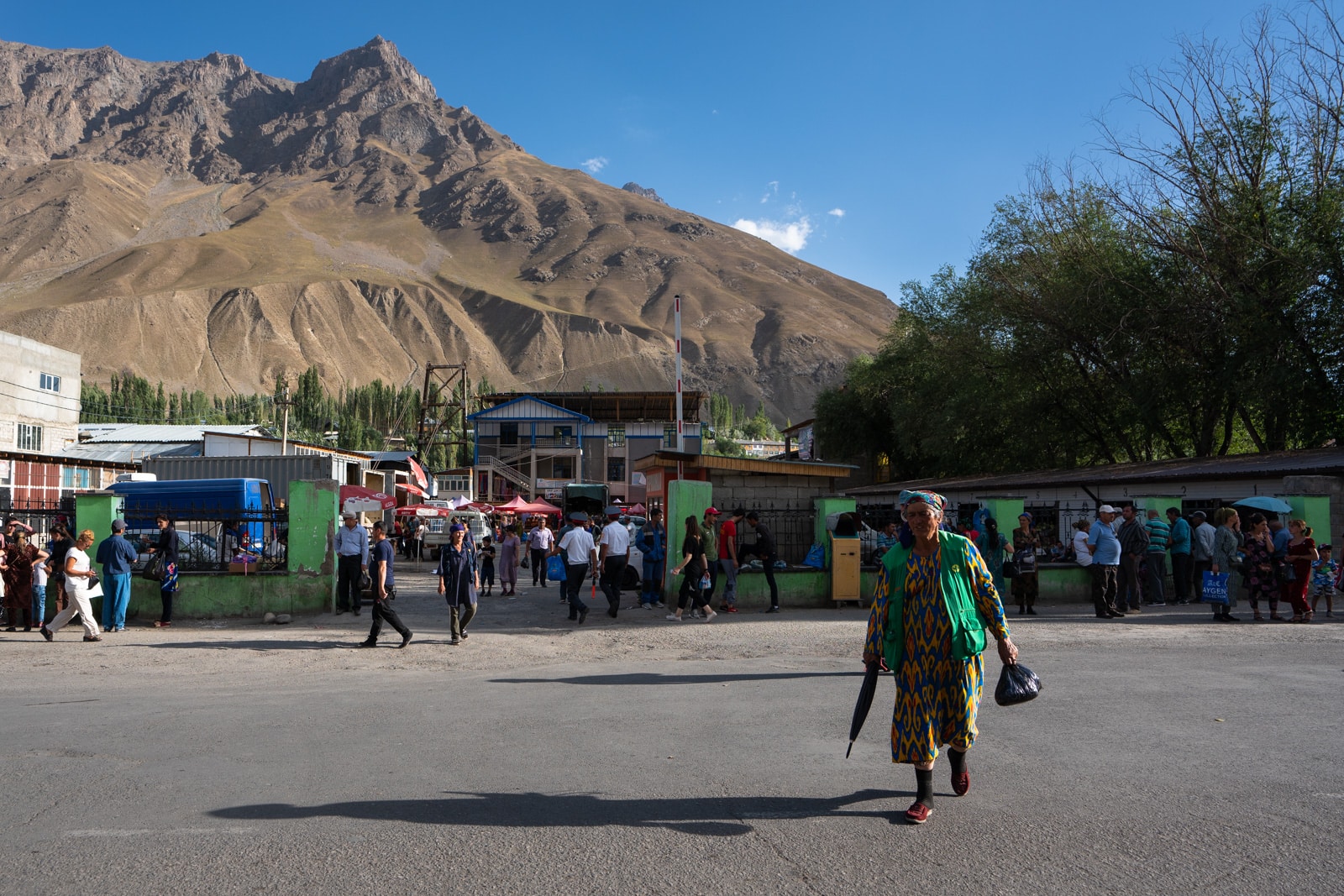
Khorog’s main street on a busier weekday
“It is very difficult to live in Tajikistan,” she continued. “There are no schedules, not enough transport, not enough food or work. It is very beautiful place to visit for people like you, but for us it is a very hard life.”
I nodded. “It’s true. We tourists can visit and enjoy the mountains, but when things get too difficult or tiring for us, we can leave.” I was all too familiar with the duality by then. “I understand not everyone has that privilege.” I thought about adding an apology, but it seemed condescending; I bit my tongue.
The Tajik woman sighed in defeat, looking out at the sparsely populated road.
“Germany is very different. From living and studying there, I now understand how hard life is here in Tajikistan.”
Our conversation continued down this downhill path for a time, until it was interrupted by opportunity: a driver looking for passengers to my destination.
Saying goodbye and wishing her luck, I went my way; the last I saw of the woman was her floral black kurta, fluttering as she dashed toward a car that might have been heading in her direction.
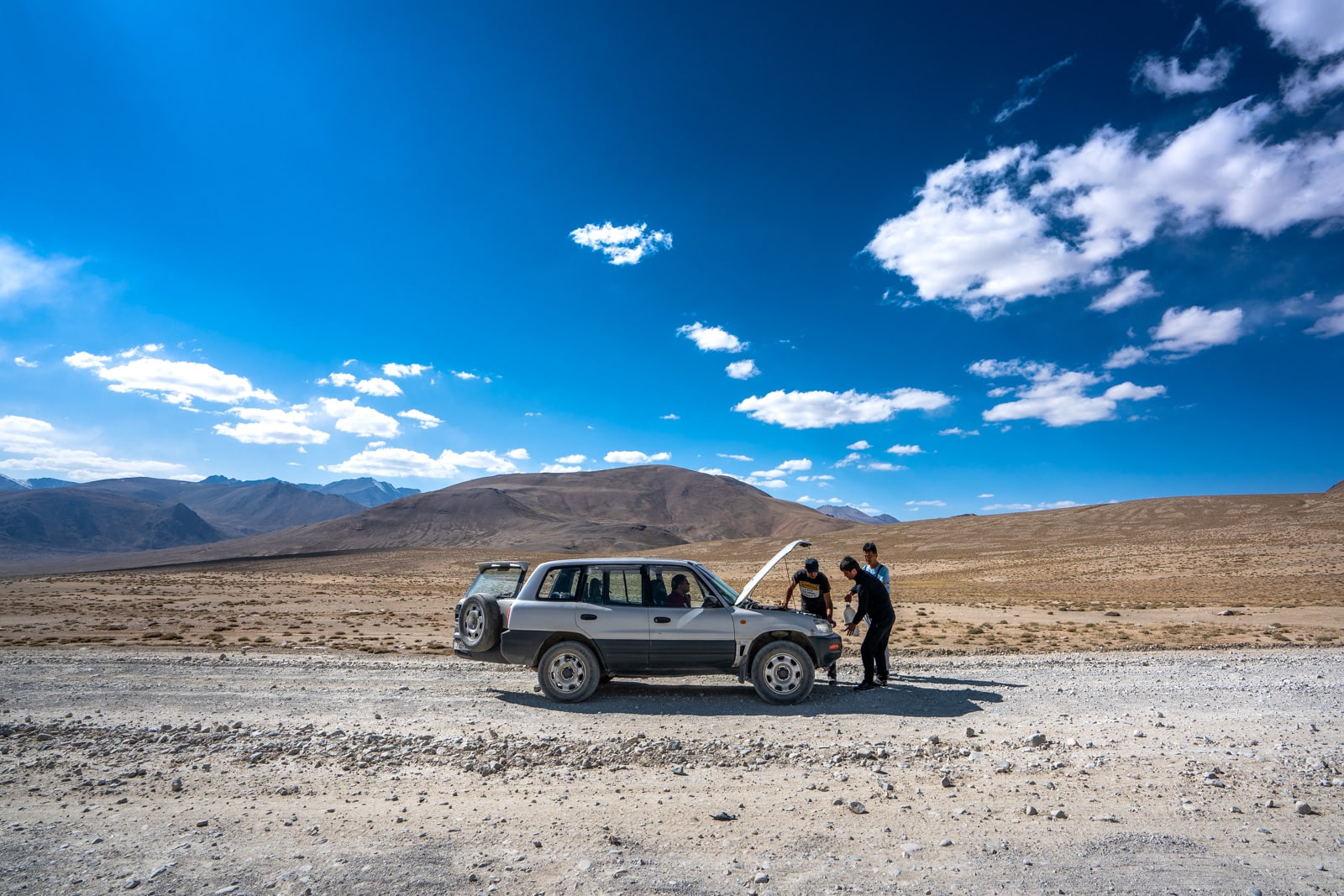
The shared taxi having a bit of a breakdown—the first of many—en route
Privilege in the Pamir
The shared taxi crawled along the dusty Pamir Highway as I sifted through thoughts. They transported me back to my Monpura bed: pondering privilege as I sought adventure in a remote region of the world. This time, the whine of hungry mosquitoes was replaced with the tired taxi’s groan as it climbed mountain passes.
My brain conjured an image of the Tajik girl sitting with the doctor behind his desk, eyes boring into me as I gazed unseeingly at desolate high altitude landscapes. Why are you here? Why did you come to this difficult land?
My thoughts flitted, reflecting on all the “difficult” places I had visited and glamorized in my previous three years of travels. All the times my privilege as a foreign tourist was painfully obvious, yet unnoticed by me:
Sipping tea in Afghanistan as people shared stories of friends lost to bombings and financial hardships from war, knowing I’d fly away mere days later.
Haggling over costs of a bicycle so I could cycle around another remote Bangladeshi island alone—something most local girls would not be allowed to do.
Assuring villagers in Pakistan’s mountains they live in paradise one sunny summer afternoon, though I’d never lived through a harsh winter with limited supplies, restricted road access, and scarce heating.
Hmm.
It’s easy to don rose-colored glasses and declare a place paradise when you’re on holiday, unburdened by any of the realities of life there. But as I took my mental step back and attempted to remove my glasses, I found it disturbing that this had not really occurred to me earlier.
Pretentious people spend a lot of time trying to differentiate between tourists and travelers. Normally I try to avoid the semantic discussion, but in that moment, the debate seemed more absurd than ever before. Traveler, tourist, it doesn’t matter—what does matter is that both “travelers” and “tourists” alike have the freedom and means to move simply because we want to.
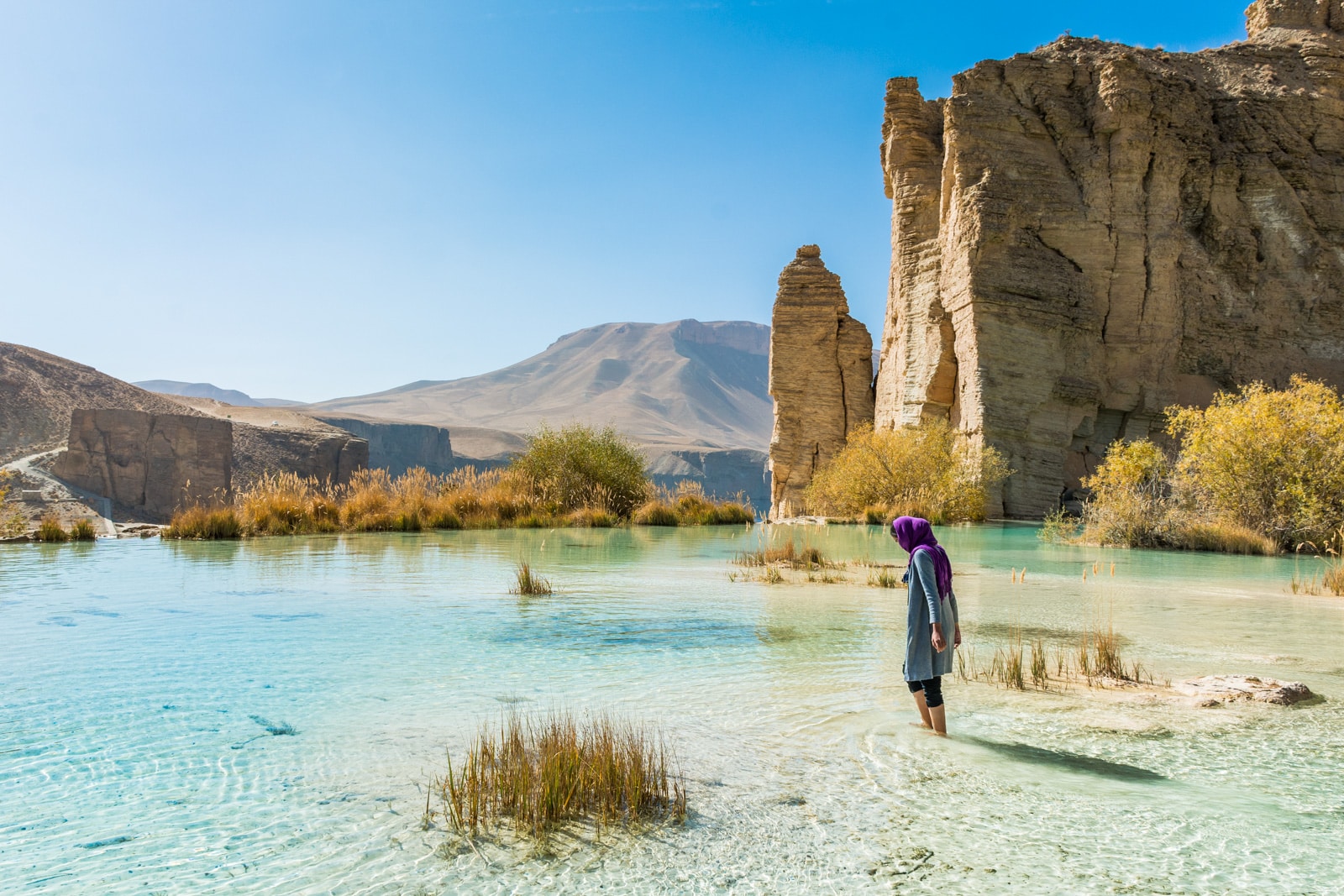
Enjoying the striking Band-e Amir lakes in Afghanistan because I chose to, not because that’s all I can access.
Apocalypse astounds me
Maybe it’s a stretch, but in Apocalypse 2020, I find the discussion more relevant now than ever before.
In the span of a few weeks, coronavirus completely changed the world as we knew it. As countries closed, and reports began to roll in about the risks of the virus and its potential dangers to our societies, another discussion emerged: the ethics of traveling in a pandemic era.
I watched as (often) Western influencers continued travels in developing countries, despite overwhelming amounts of information illustrating how irresponsible travel was at the time. Decisions like this are easy when you know if anything truly bad happened to you, you can be whisked away to safer pastures and better infrastructure, or afford in-country treatment… possibly at the expense of a less-privileged local in need.
Other Western travelers purposefully carried on with their planned vacations, getting aggressively defensive when others questioned their decisions. They paid the money, they made their plans—they had a right to their vacation, even though they were putting others at risk by traveling and potentially spreading the virus.
The entitlement was appalling. The ignorance or disregard for locals’ safety, disturbing.
Lockdown has given me the space to sit and think without distractions… and finally, more than two years after my discussion with the doctor, I’ve found order for my thoughts.
Tourist privilege: the freedom to be curious
In my opinion, it’s not wrong to travel to “far-flung” places. To seek a nuanced perspective in a country you only know from news headlines. To find beauty in a slower pace of life, even one burdened with hardships. To immerse yourself in environments completely foreign to you.
For (hopefully) many of us tourists, these desires stem from something innocent: curiosity. A desire to experience places that challenge our understanding of the way life works. A chance to broaden our perspective about our species, its myriad cultures, and the planet that hosts us.
The issue with this curiosity is that we often feel entitled to exercise it. The freedom to satiate it is taken for granted. In this day and age, many tourists view travel as a right, not a privilege.
If you’re reading this, you’re privileged enough to be highly educated and speak English. You can afford smart devices, data, and/or a WiFi connection. Your life is stable enough that you have time to sit and read some random girl’s blog posts online. Even if your passport, finances, or circumstances restrict your travels, chances are you still have the privilege of choosing where you live or go to some extent.
Don’t feel guilty about it. Foundations of privilege are out of our control, laid over centuries of discrimination and biased systems. The problem is when we don’t acknowledge its existence, or deny we benefit from our own. We can’t work toward equality if we’re embarrassed to admit inequality exists in the first place.
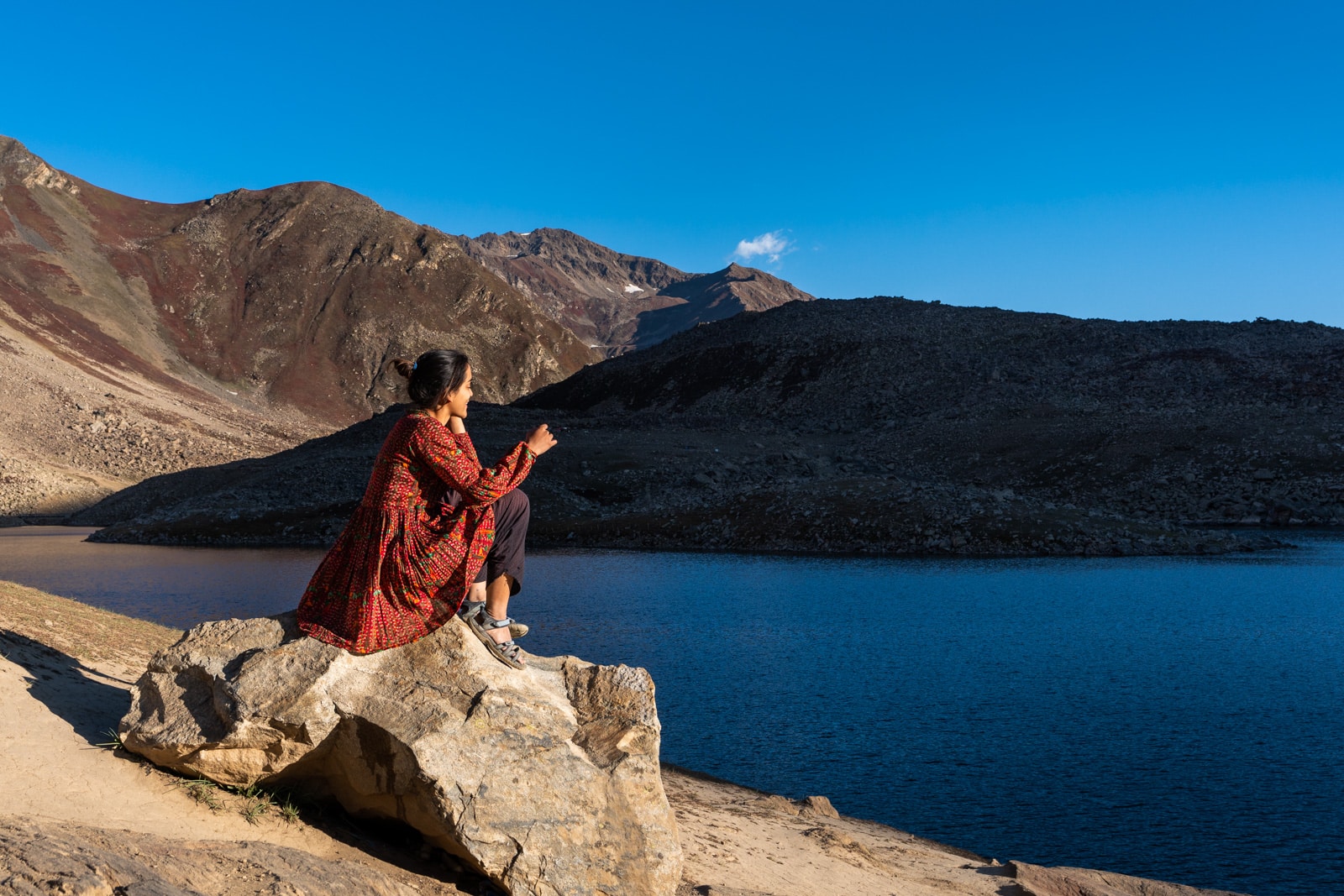
Pondering place at Pakistan’s Lulusar Lake
Dreams of paradise
I’m not trying to ruin your bucket list or undermine your travels. By all means, continue to dream of traveling the Silk Road, or sequestering yourself on remote islands, or finding peace in village life. I’m right there dreaming with you.
All I’m sayin’ is: check yo’ self.
As (again hopefully) aspiring responsible travelers, we all need to look and think more deeply about the places we visit. Why we want to visit? How should we act when we arrive? What can we do to ensure our impact is positive?
Part of traveling responsibly is recognizing that we’re privileged to be able to travel at all, and not abusing our privilege. Instead, we should find ways to use our privilege to empower those who are less so. (No, giving handouts does not count.)
Go forth and travel. Just don’t forget that you, the tourist, have the privilege to visit a destination, skim its surface, perceive it as paradise… then leave when paradise gets old or times get tough. Locals often cannot.
Even in purported paradise, there’s always more going on under the surface than meets the eye. Especially in dreams.
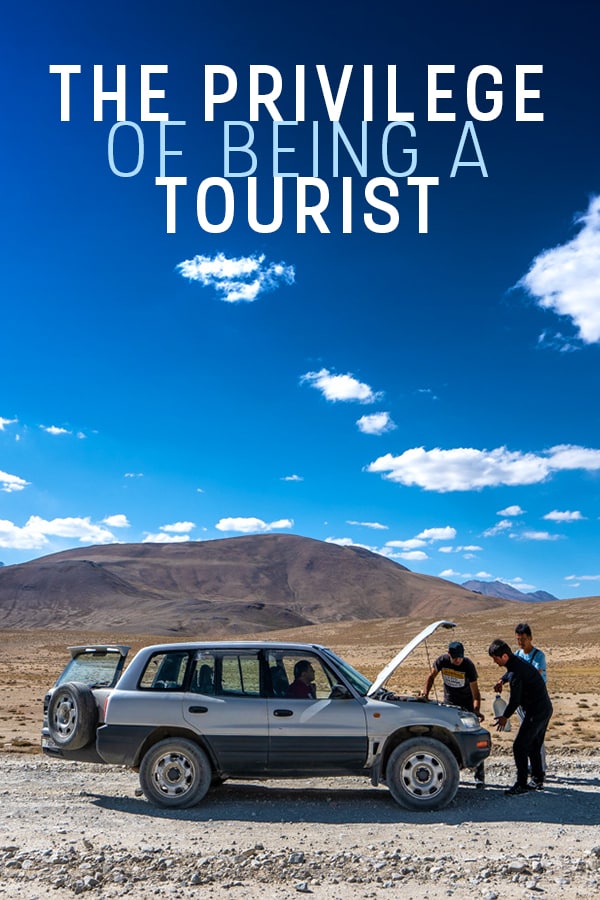
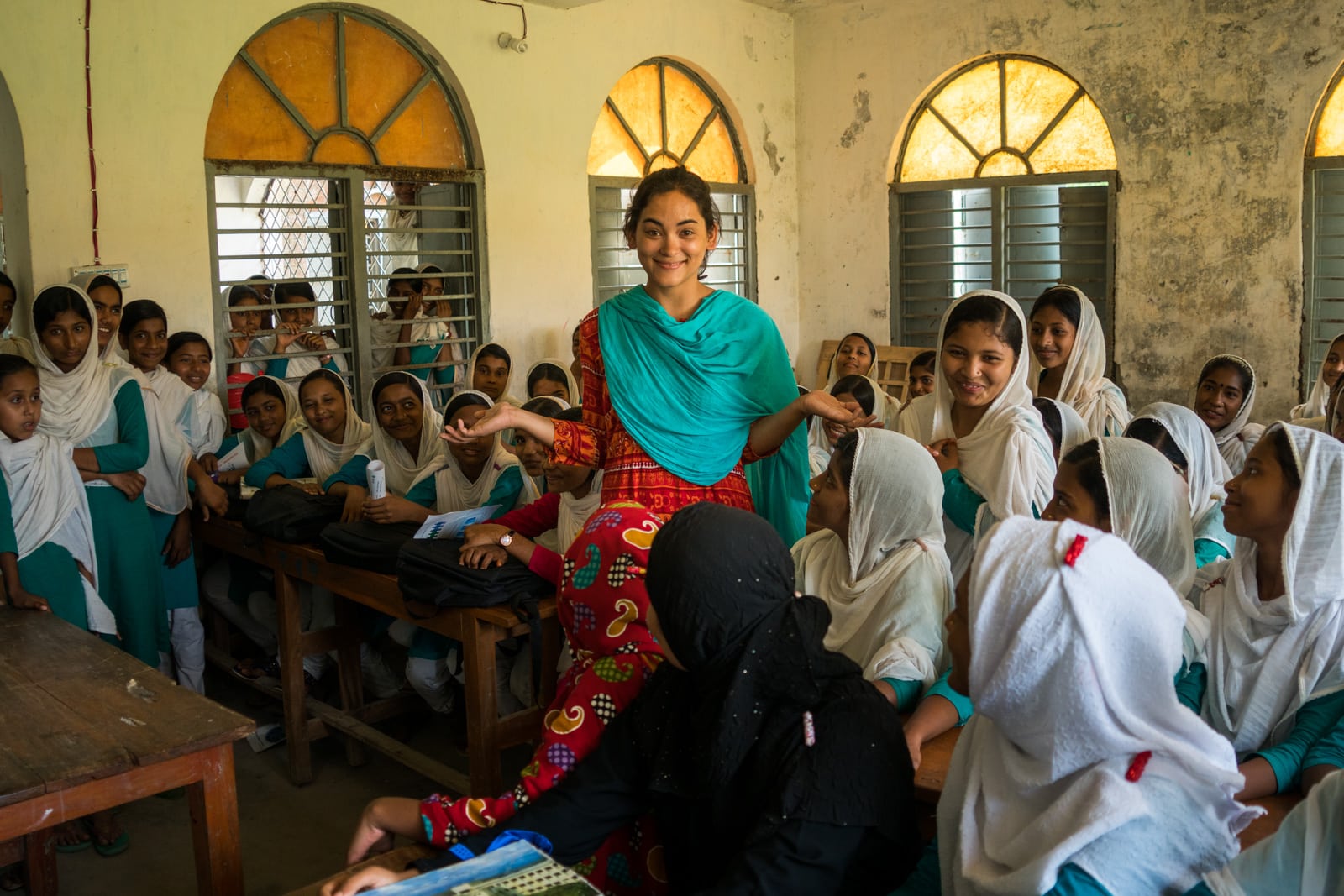


I’ve spent a lot of time thinking about traveler privilege during my solo travels thru Mexico. It was in Chiapas that I sat as an observer of other tourists for many weeks, feeling sad by their innocent ignorance. I’m a slow tourist. I like to try to get to know a place a little better, level off, and then dive even deeper before leveling off again. I was staying for 1.5 months in a town where tourists tend to spend only one or two nights visiting the top attractions. I am still trying to figure out why the fast tourists made me angry and in defense of the locals. Your post here has certainly expressed this battle that’s been going on in my head. 🙂
Mexico must be a very strange place to travel given the number of ignorant American tourists who end up there. And traveling slowly would give you much more time to witness the negative repercussions of the flash tourism. I still remember one of the first moments in my life where I began to realize how twisted mass tourism was – someone close to me telling me they visited an “authentic poor people village” on their cruise to Mexico. Oh my…
I love the way you write. To my thinking, it seems that you have truly travelled because you have opened your heart no matter where you were. You have seen the beauty in places and people because of that. You have also seen the flipside of suffering and ugliness because you didn’t close your eyes to that. I think most people just shut down so your courage moved me. I have travelled all over the world and also stayed incredibly still for a long period of time. Beauty, suffering- seem to me to be everywhere in equal proportions whether you are travelling half-way across the world to a third-world country or just going down a few streets to an underprivileged neighbourhood in a developed country…. I really don’t think this traveller privilege thing applies to you. If anything it applies to those staying in the cocoons of five star hotels in poverty-stricken countries and even to those just living in any kind of selfishly-comfortable cocoon in their own countries.
I truly believe that, what strikes me as the generosity of your spirit as you move through the world is one of the most important gifts anyone can give another. If one continues to move through life seeking and demonstrating our common humanity and the resilience of the human spirit everywhere, life becomes a privileged and adventurous journey, even if it’s just a trip down to the corner grocery store – and you deserve every moment you are blessed with!
I’m chuffed that you think so! That’s very generous of you. Even though I make an effort to be more aware, I’m certainly still a privileged tourist. Like you said, there’s a lot of both beauty and suffering to witness everywhere in the world, at home and further afield. What matters is that we acknowledge it and try to learn from it (and support others where it’s appropriate)… or, that’s what I tell myself, anyway!
This is fantastic. Perspective, point of view. Those are the words I think of when I read this post. Having the privilege of visiting those places but also having the privilege of not staying, that is something I’ve never thought of. Thinking of others but from their eyes, how they would see what I am doing there, observing them. They observe me. I’m glad you brought that to my perspective.
It’s an interesting mental exercise isn’t it, assessing yourself from the perspective of locals when you travel? Something we all should do more, I think—it could help people to be a bit more respectful and reasonable when out on the road.
It’s good to be a tourist and here at #Nkuringosafaris appreciate this vital information
Alex, there are, if I may, two distinct kinds of curiosity. The spectrum between the two is large.
Curiosity being the main ingredient of travel, tourism, and exploration, the first is Curiosity & Kindness. The second might be called Curiosity & Exploitation.
The first is what you refer to as being keenly aware of one’s privilege and bestowing that privilege upon those you are visiting. Such privilege is then reflected with humility and acts of kindness. Generosity and friendship abound and this carries over into all the lives that are affected. One could be in a place for a night and have both curiosity and kindness.
The other has more to do with exacting one’s privilege upon others. A sense of superiority without regard for humanity and the local predicament. Strangely, when it comes to what the West calls underdeveloped countries, the physical hardships are only in comparison to western economies and practices. The West has physical luxury, and we call this the work of “civilization”. What many other indigenous and “developing country” cultures have, although lacking these luxuries, is a sense of community, comradery, and wholeheartedness. Something westerners and especially tourists often lack but seek.